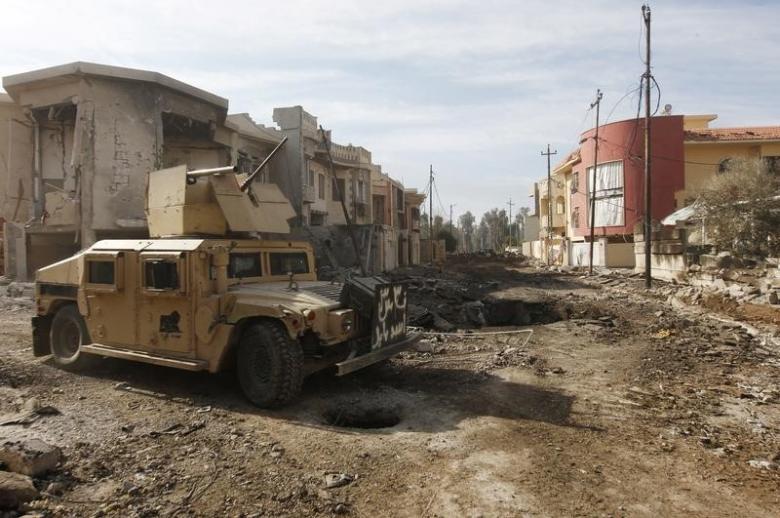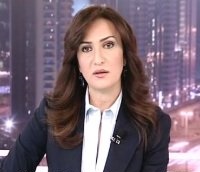Alaa Al-Marjani/Reuters
By
Rafah Al Saad
The battle for the west side of Mosul is very important not only for Iraq but for the whole world as Mosul is one of the biggest strongholds for ISIS, the Iraqi military and Shia militia also participating in the battle of Mosul.
Manoeuvres are now to the east side of Mosul though the west is still facing some attacks from ISIS by the use of drones, bombs and car bombs, in addition to there being many sleeper cells still working against the Iraqi military.
The west of Mosul is a dangerous battle, military leaders stating that around 40% of peope having been liberated from the city of Nineveh. There are 92 residential areas and streets, in addition to 20 government departments.
The estimated number of residents in the right, or eastern side of Mosul, is approximately 750,000, the United Nations expecting 500,000 people displaced from the west side,
So let’s also talk about what is important in the eastern side of Mosul. There are seven big hospitals and a medical college, the oldest college in Iraq. The right, or eastern side is very important because it is the link between Iraq and Syria, as well as hosting a large commercial centre.
There are residential areas like “17 Tammuz” and “al-Yarmouk” which are dangerous districts on the eastern side due to being strongholds for ISIS as confirmed by military sources.
There is also Mosul airport and Ghazlani military base, the largest base. In addition there are around 30 monuments and the al-Nuri Mosque where ISIS leader Abu Bakr al-Baghdadi appeared for the first time, as well as 25 old and new churches, like the Roman Catholic Church (built by the Dominican Fathers in Nineveh Street in 1893).
The US Secretary of Defense, James Mattis said there are 2,000 Daesh fighters in the west of Mosul. Western sources said it will be a very difficult battle and will continue for a long time, more than the battle on the left side. Now Iraqi forces and Shia militia “Hashd al-Shaabi” have trapped ISIS and cut off their supplies.
The political leaders are now talking about what will happen after Daesh in Mosul. The biggest problem will be after the battle, Iraqi political leaders including the Kurdish leaders, US leadership, Turkish government, Iran and some neighboring countries, all have ideas about Mosul and how it will be after Daesh, how they will control it, and how they will divide it between them.
But they forget what the people of Mosul want, and how they will help them to forget the injustices of ISIS, how they will rebuild the women, children and their lives.
Human rights organizations warned of violations and sectarian reprisals, especially after participation of the popular crowd militias. On numerous occasions Iraqi Prime Minister Haider al-Abadi said the popular crowd will not enter Mosul city but they have already entered, something we can see from the photos and videos published in newspapers and on TV.
For three days the Arab tribals, who lived on the right side of Mosul, protested against the participation of the popular crowd militias “Hashd al-Shaabi” and demanded that the Abadi government prevent them from entering their city, as well as the opening of safe corridors for besieged families.
We have to note also that Daesh occupied Nineveh Province in June 2014 and imposed on Mosul people their extremist laws, including many mass executions. During the ISIS government of Mosul for example, most of the phone lines had been cut by ISIS, many cell phone towers and internet access points destroyed, as well as the destruction of many monuments in Mosul.
ISIS also ordered men there to grow moustaches and beards, men in Mosul not allowed to wear jeans. For the women in Mosul ISIS forced them to wear a cloth that covered their body completely from the head, including the face, to the feet.



I think this article has raised important points about the fighting for Mosul, and the ability of Iraqis to recover from the rule of ISIS. However, it does leave us with a number of serious questions. The warfare to capture Mosul cannot be understood without first comprehending the criminality of the 2003 invasion of Iraq by the United States. That invasion shattered a society, albeit one operating in a truncated way under Ba'athist rule and US sanctions that were a form of warfare. While there was a huge outcry about the human rights abuses perpetrated by the former Ba'athist regime, there has been very little, if any, investigation of serious human rights abuses by the post-invasion Iraqi authorities and their American supporters. The siege of Mosul is taking a heavy toll on civilians, comparable to the Russian bombardment of Eastern Aleppo. Once again, while we see anti-Russia hysteria reach unbelievable proportions as the imperialist government raise hypocritical concerns about Russian military actions in Aleppo, hardly a whisper is heard about the equally reprehensible actions of the US military and its proxies in Iraq. A quick victory was promised by the Iraqi authorities in Baghdad. That victory is looking ever-more remote, as the coalition of anti-ISIS forces are grinding to a halt in Mosul. The anti-ISIS groups, while united by their shared hostility to ISIS, are in no way capable of resolving the political conflicts and sectarian divides that have arisen since the 2003 American invasion. If anything, the fracturing of Iraqi society along sectarian lines is as great a crime, possibly even greater, than the impact of ISIS rule in Mosul. What is needed now is the courage to speak up and state categorically that the Iraq invasion was not a mistake or blunder. It could not have been carried out in an improved or better way. It was a criminal war of aggression against a state that did not pose any threat to others outside its borders. Indeed, the tragedy of Iraq's fracturing can be traced back to the 1991 American attack, ostensibly done to expel Iraqi forces from Kuwait. Actually, the 1991 aerial assault was one of the most cowardly, obscenely unjust wars ever fought, pitting the mechanized might of the American war machine against a smaller, much weaker country. Thanks